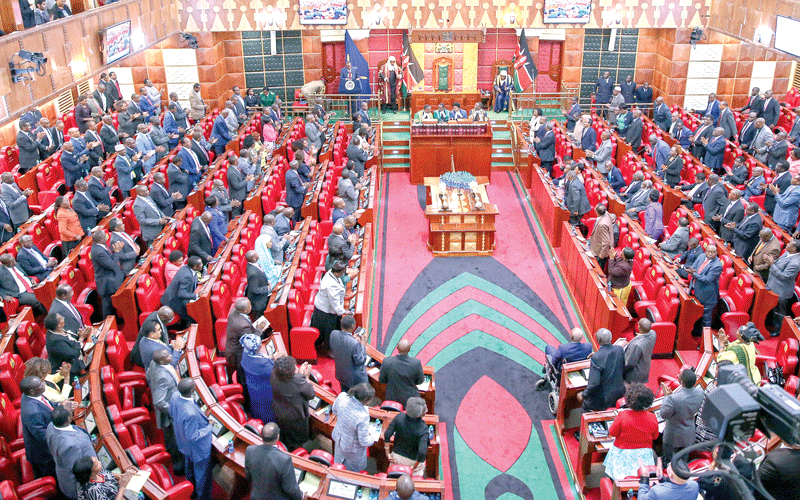PSC now appeals court ruling on MPs’ allowances refund
By Bernice Mbugua, January 22, 2021Parliamentary Service Commission (PSC) has appealed the decision of the high court which ordered MPs to refund House Allowances that they unlawfully awarded themselves in 2019.
PSC, through Professor Tom Ojienda, argues that Salaries and Remuneration Commission has a general function under Article 230(47) of the Constitution as concerns the remuneration and benefits payable to all State Officers, whereas PSC has a specific function which concerns the direct and immediate facilitation of MPs towards the efficient and effective functioning of Parliament and the fulfilment of the mandate of Parliament.
A three-judge bench last December had ordered Clerks of the Senate and the National Assembly to recover in full House allowance monies paid to the MPs through their salaries and allowances within a period of 12 months.
In their judgment, Justices Pauline Nyamweya , Weldon Korir and John Mativo had noted that the approval of the payment of an accommodation or house allowance to Members of Parliament is a function that is exclusively vested in the Salaries and Remuneration Commission
In it’s appeal, however, PSC argues since the mandate of PSC in the facilitation of MPs is more specific than the SRC role which is general to all State officers, Article 127(6)(a) of the Constitution should have prevailed against the general provision .
“The learned judges erred in law and fact by issuing declaratory orders vesting the SRC with exclusive powers to set and approve the payment of facilitative accommodation to Members of Parliament (MPs), contrary to the provision 1276)) and (e) of the Constitution and Section 2 of the Parliamentary Service Act. No. 22 of 2019,” claimed PSC in court documents.
According to PSC through Ojienda the judges of the High Court erred in their interpretation of the financial functions of PSC under the Constitution and statute .
“Their interpretation renders PSC powerless and irrelevant though both PSC and SRC are at par as independent constitutional commissions established as such under Chapter 15 of the Constitution,” argued Ojienda in court documents.
According to PSC, MPs do not earn a consolidated pay but a gross pay that is not inclusive of house allowance, neither for their housing in the counties or constituencies nor their accommodation in Nairobi while they attend to parliamentary business in the Capital.
“MPs have also not been excluded from the application of section 31 of the Employment Act, 2007 (Act No. 11 of 2007); and 21..So long as SRC only provides MPs with a gross pay exclusive of any housing allowance whatsoever, PSC is under obligation to provide housing facilitation to MPs, especially in order to facilitate them in their accommodation in Nairobi while attending to legislative business in Parliament,” argues PSC.
PSC contends that the three-judge bench erred in their finding that SRC acted within its mandate by directing the Clerks of Parliament not to pay the impugned allowance and that in doing so SRC did not in any way interfere with the constitutional independence and functions of Parliament and PSC.
“The actions of SRC trampled on the independence of PSC and Parliament as an independent constitutional commission and an independent arm of government, respectively,” argues PSC.
It’s PSC contention that the learned judges erred in failing to make a finding and setting the record clear on how MPs should be accommodated in Nairobi while they attend to parliamentary and legislative business in Parliament and in tandem with their constitutional mandate under Chapters Seven and Eight of the Constitution.
PSC contends that the judges erred in fact and law in their finding that the salaries and remuneration structure of SRC was not discriminative against MPs in comparison to similarly ranking State Officers and lower ranking civil servants contrary to Article 27 of the Constitution
“Parliament is an independent arm of government and is in the same rank as the Executive and the Judiciary and is not in any case lowly ranked in comparison to Chapter Fifteen constitutional commissions,” argues PSC.
